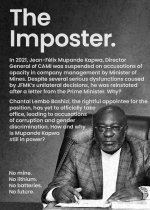Agree : does anyone remember the corruption in Indonesia that came to the world's attention in the late 1990,s. Can't quite remember who was running that ?This whole narrative they have created about Felix not knowing the real truth is a load of Bull Sh1t . Just an excuse for him to stay out of it and let his corrupt ministers deal with it . IGF report has been out for months . He's not interest .
You are using an out of date browser. It may not display this or other websites correctly.
You should upgrade or use an alternative browser.
You should upgrade or use an alternative browser.
AVZ Discussion 2022
- Thread starter GazDix
- Start date
David holland
Regular
Are we ever going to be back
Winenut
GO AVZ!!!!
Mupande...Agree : does anyone remember the corruption in Indonesia that came to the world's attention in the late 1990,s. Can't quite remember who was running that ?
or Putin
Can't remember which
Agree : does anyone remember the corruption in Indonesia that came to the world's attention in the late 1990,s. Can't quite remember who was running that ?
And who could forget the Malaysian Sovereign Wealth Find 1 (1MDB). In 2015, Malaysia's then-Prime Minister Najib Razak channeled over RM 2.67 billion (US$700 million) from the fund into his personal bank accounts, and he thought it was OK.
By that standard, the DRC is barely corrupt at all (ha fucking ha, the DRC is corrupt to the core).
Cheers
F
Last edited:
Spikerama
Regular
And who could forget the Malaysian Sovereign Wealth Find 1 (1MDB). In 2015, Malaysia's then-Prime Minister Najib Razak channeled over RM 2.67 billion (US$700 million) from the fund into his personal bank accounts, and he thought it was OK.
By that standard, the DRC is barely corrupt at all.
Cheers
F
Ahhh... no. How wrong you are. Go and have a look at what the Kabila family did with BGFI Bank and SudOil.
And this was way before Sicomines scam.
Anyway I know I've been "told" but you guys deserve a Friday tasty snack to spread across the interwebs. So speaking of Mupande @Winenut, do your worst with this. Theres a French one in the Assets folder as well. It works even better.

AVZ Assets for Social Media Campaign
Hi everyone. As requested here is a thread that will contain all the links to the assets I have been creating. Feel free to use them throughout social media whenever and whereever you see an opportunity. If I can make one suggestion it is if you are going to screen shot them and post the image...
 thestockexchange.com.au
thestockexchange.com.au
Attachments
Ahhh... no. How wrong you are. Go and have a look at what the Kabila family did with BGFI Bank and SudOil.
And this was way before Sicomines scam.
Anyway I know I've been "told" but you guys deserve a Friday tasty snack to spread across the interwebs. So speaking of Mupande @Winenut, do your worst with this. Theres a French one in the Assets folder as well. It works even better.

AVZ Assets for Social Media Campaign
Hi everyone. As requested here is a thread that will contain all the links to the assets I have been creating. Feel free to use them throughout social media whenever and whereever you see an opportunity. If I can make one suggestion it is if you are going to screen shot them and post the image...thestockexchange.com.au
It was tongue-in-cheek mate.
I will amend it so it reads as intended.
Cheers
Spikerama
Regular
Oh no don't get me wrong dude. I hate Najib Razak. Especially what he did to Anwar. I worked in Malaysia for quite a while so you know, I get the reference and was so glad to see it all unravel.It was tongue-in-cheek mate.
I will amend it so it reads as it should.
Winenut
GO AVZ!!!!
Lithium Plus....id love to know what Mr Bin Guo and his non executive management team (ghost team) is actually up to.
They’ve invested far more in AVZ than what their own market cap is; a one roomed office down in Sydney from where they registered as an Australian company without doing a tap for 4 years...apart from sucking in AVZ shares...now on the asx with a couple of corn flake box lithium projects up in the NT....likely never put foot past the gates up there either
They're looking at rat-fucking AVZ and making sure the whole of Manono ends up Chinese controlled
Next question?
Flexi
Regular
Spike,Oh no don't get me wrong dude. I hate Najib Razak. Especially what he did to Anwar. I worked in Malaysia for quite a while so you know, I get the reference and was so glad to see it all unravel.
Just noticed on the English version the 4 pints at the bottom are in French.
cheers
Spikerama
Regular
Thanks mate will fix after tea.Spike,
Just noticed on the English version the 4 pints at the bottom are in French.
cheers
Ferguson, the guy even lost weight; the Manono lithium file... AVZ will end up recovering its right and making Manono take off, the populace of Manono is only waiting for the GOOOO...
The futures so bright he's got to wear shades. Indoors.
mouseflying
Regular
Spikerama
Regular
Spike,
Just noticed on the English version the 4 pints at the bottom are in French.
cheers
All fixed now. Thanks for the heads up.

AVZ Assets for Social Media Campaign
Hi everyone. As requested here is a thread that will contain all the links to the assets I have been creating. Feel free to use them throughout social media whenever and whereever you see an opportunity. If I can make one suggestion it is if you are going to screen shot them and post the image...
 thestockexchange.com.au
thestockexchange.com.au
They're not very intelligent, if they're trying to delete all pages re AVZ.
There's something called cached pages with Google.

Fraud is not allowed in the DRC, several questions to Avz | Politico.cd
1ère source de l’actualité politique et économique en temps réel en RDC. Les dernières nouvelles, les enquêtes et les révélations exclusives.
 webcache.googleusercontent.com
webcache.googleusercontent.com
hahaha
I wonder if we get a mention at the meeting of the dons this weekend.They're not very intelligent, if they're trying to delete all pages re AVZ.
There's something called cached pages with Google.

Fraud is not allowed in the DRC, several questions to Avz | Politico.cd
1ère source de l’actualité politique et économique en temps réel en RDC. Les dernières nouvelles, les enquêtes et les révélations exclusives.webcache.googleusercontent.com
hahaha
9cardomaha
Regular
In country? Would it hurt to let us know, instead of leaving cryptic clues.
Regardless LEGGO AVZ!
Mute22
Regular
Convenient he is wearing a black suit, shareholders can put him straight into the casket if they don't get ML
Similar threads
- Replies
- 7
- Views
- 5K
- Replies
- 0
- Views
- 2K
- Replies
- 0
- Views
- 2K
- Replies
- 0
- Views
- 2K


